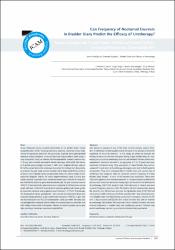| dc.contributor.author | Yazıcı, Cenk Murat | |
| dc.contributor.author | Doğan, Çağrı | |
| dc.contributor.author | Nalbantoğlu, Burçin | |
| dc.contributor.author | Malkoç, Ercan | |
| dc.date.accessioned | 2022-05-11T14:12:35Z | |
| dc.date.available | 2022-05-11T14:12:35Z | |
| dc.date.issued | 2015 | |
| dc.identifier.issn | 1309-0720 | |
| dc.identifier.issn | 1309-2014 | |
| dc.identifier.uri | https://doi.org/10.4328/JCAM.1843 | |
| dc.identifier.uri | https://hdl.handle.net/20.500.11776/5606 | |
| dc.description.abstract | Aim: Nocturnal enuresis is one of the most common urinary system disorders of childhood. Urotherapy(behavioral therapy) is the primary method for treatment of nocturnal enuresis. In this study, we aimed to evaluate the efficacy of nocturnal enuresis frequency during 3 days bladder diary for estimating the success of urotherapy. Material and Method: Patients with monosymptomatic nocturnal enuresis in an age group of 5 to 18 years were prospectively included to study. They were given a 3 days bladder diary and re-evaluated 1 week later and urotherapy strategies were told to both patients and parents. They were evaluated after 3 months later and success rate of urotherapy was compared with the nocturnal enuresis frequency in 3 days bladder diary. Results: A total of 66 patients were evaluated. There were 26(39.4%) patients with nocturnal enuresis in >3 nights/ week and 40(60.6%) patients with nocturnal enuresis in every night. At the end of the third month of urotherapy, 50(75.7%) patients had >%50 decrease in clinical nocturnal enuresis frequency, whereas 16(24.3%) had no clinical improvement. Among the patients who did not have enuresis during bladder diary, 21(91.3%) had improvement with urotherapy. All of the patients with 1 day nocturnal enuresis in bladder diary had improved by conservative strategies, whereas 53.3% with 2 days enuresis and 22.2% with 3 days enuresis was able to improve by urotherapy. Discussions: We observed a direct relation between nocturnal enuresis frequency in bladder diary and urotherapy success. Clinician may predict urotherapy success by an attentive bladder diary evaluation. | en_US |
| dc.language.iso | eng | en_US |
| dc.publisher | Derman Medical Publ | en_US |
| dc.identifier.doi | 10.4328/JCAM.1843 | |
| dc.rights | info:eu-repo/semantics/openAccess | en_US |
| dc.subject | Nocturnal | en_US |
| dc.subject | Enuresis | en_US |
| dc.subject | Urination | en_US |
| dc.subject | Behavioral Therapy | en_US |
| dc.subject | Children | en_US |
| dc.subject | Prevalence | en_US |
| dc.subject | Schoolchildren | en_US |
| dc.subject | Adolescents | en_US |
| dc.title | Can Frequency of Nocturnal Enuresis in Bladder Diary Predict the Efficacy of Urotherapy? | en_US |
| dc.title.alternative | İşeme günlüğünde tespit edilen noktürnal enürez sıklığı, üroterapi başarısını öngörebilir mi?] | en_US |
| dc.type | article | en_US |
| dc.relation.ispartof | Journal of Clinical and Analytical Medicine | en_US |
| dc.department | Fakülteler, Tıp Fakültesi, Cerrahi Tıp Bilimleri Bölümü, Üroloji Ana Bilim Dalı | en_US |
| dc.department | Fakülteler, Tıp Fakültesi, Dahili Tıp Bilimleri Bölümü, Çocuk Sağlığı ve Hastalıkları Ana Bilim Dalı | en_US |
| dc.authorid | 0000-0001-6140-5181 | |
| dc.identifier.volume | 6 | en_US |
| dc.identifier.issue | 2 | en_US |
| dc.identifier.startpage | 139 | en_US |
| dc.identifier.endpage | 143 | en_US |
| dc.institutionauthor | Yazıcı, Cenk Murat | |
| dc.institutionauthor | Doğan, Çağrı | |
| dc.institutionauthor | Nalbantoğlu, Burçin | |
| dc.relation.publicationcategory | Makale - Uluslararası Hakemli Dergi - Kurum Öğretim Elemanı | en_US |
| dc.authorscopusid | 8416588900 | |
| dc.authorscopusid | 55608201600 | |
| dc.authorscopusid | 36165893600 | |
| dc.authorscopusid | 35264829200 | |
| dc.authorwosid | Malkoc, Ercan/AAJ-3012-2020 | |
| dc.authorwosid | Yazici, Cenk Murat/AAA-4330-2020 | |
| dc.identifier.wos | WOS:000376563600015 | en_US |
| dc.identifier.scopus | 2-s2.0-84928528326 | en_US |



















